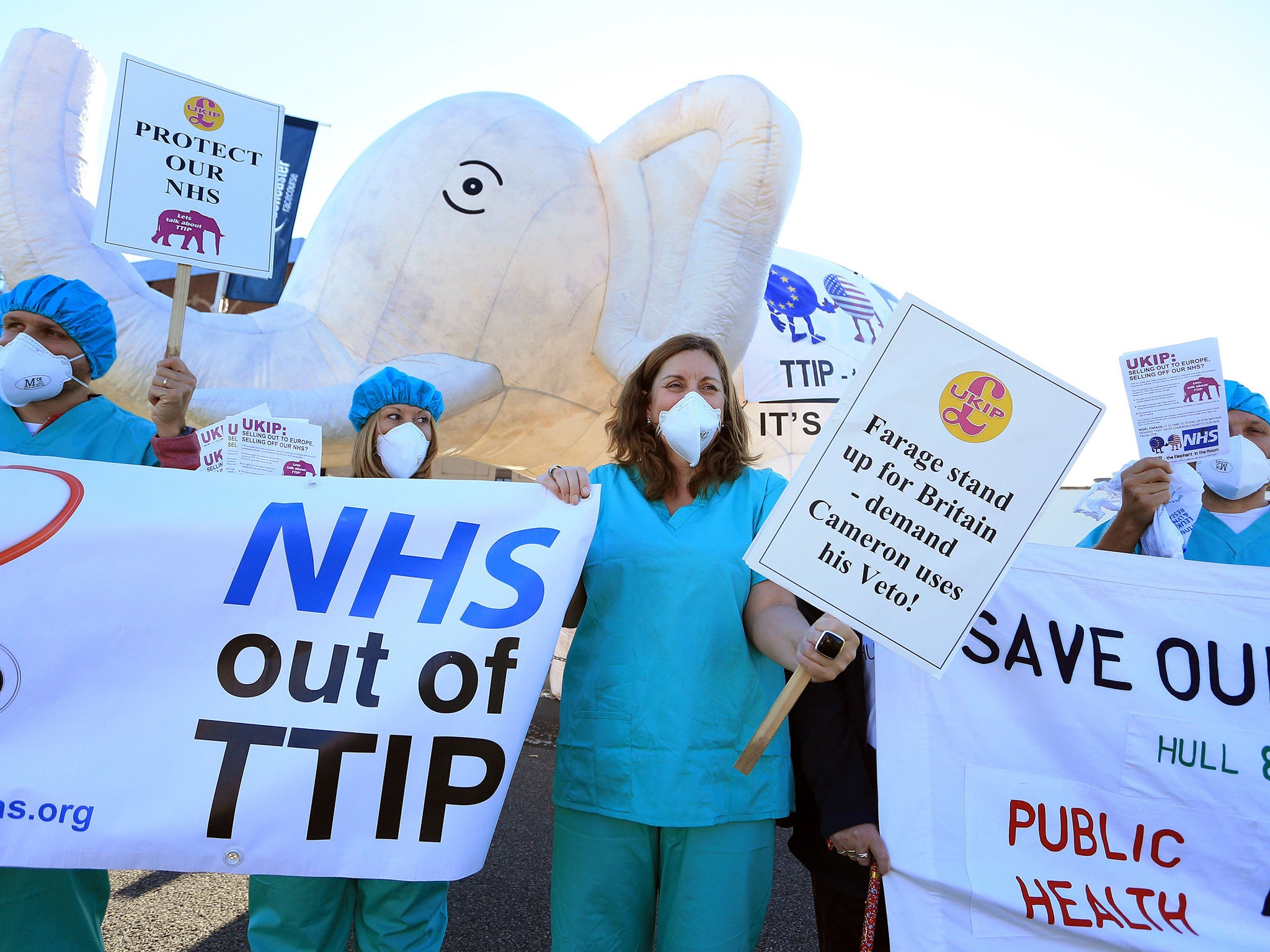TTIP campaigners hit back at Cameron claims that the NHS is protected under trade deal terms
Austria, Germany, Greece and Italy have explicit reservations in the TTIP text to protect existing rules relating to healthcare – but not the UK

Campaign groups have hit back at David Cameron’s claim that the NHS is “completely protected” under the terms of a sweeping trade deal currently in negotiation between the US and EU.
Mr Cameron said claims the Transatlantic Trade and Investment Partnership (TTIP) could lead to the irreversible sell-off of the NHS were “the reddest of red herrings” during Prime Minister’s Questions this week.
“There are plenty of reasons that people don’t want to see trade expanded, I think they should be honest about it and say they don’t like trade deals rather than using the red herring of the NHS to distract from a trade deal that could add tens of billions to our economy and generate jobs,” he said.
Unite rebutted the red herring claims. Gail Cartmail, the union’s assistant general secretary, said recent documents leaked by Greenpeace have shown that the UK Government is not acting to protect the NHS, despite warnings from lawyers that it may be at risk.
“It appears we are even being duped over protections for public services,” Cartmail told The Independent.
“We know that TTIP poses a real and serious threat to the NHS. The only way to neutralise that threat is for David Cameron to give a cast iron guarantee that he will exclude the NHS from the trade agreement,” she added.
War on Want, a group that campaigns against international poverty, said that the Prime Minister was “playing the public for fools".
"The only slippery fish here is the Prime Minister, whose rhetoric flies in the face of two sets of legal opinion stating the NHS is in danger. As well as this, the EU’s published TTIP offer clearly shows the NHS is up for grabs," said Mark Dearn, War on Want's senior trade campaigner.
Austria, Germany, Greece and Italy already have explicit reservations in the TTIP text to protect existing rules relating to healthcare. But the UK hasn’t entered any reservations in this part of the TTIP text because the Government believes that the NHS is already sufficiently protected under the terms of the deal.
A spokeswoman for the Department of Business, Innovation and Skills told The Independent that the NHS “will not be compromised for gains in any other part of the TTIP deal”.
“We believe, as does the European Commission, that provisions in the current TTIP texts and previous trade deals achieve this protection,” the spokeswoman said.
Lawyers working for Unite have said that TTIP will give investors more powers to sue the UK Government for loss of profit if it changes the way the NHS is organised. This might mean that if services were sold off, they could not be renationalised without the threat of litigation from private firms.
Unite has written two unanswered letters to the EU minister for trade contending that the “right to regulate”, which is supposed to give governments the power to renationalise public services, is inadequate.
Tamara Hervey, a professor of EU law at the University of Sheffield, said that she believed the TTIP documents would allow for future governments to renationalise the NHS, depending on its interpretation. But she said the one way to safeguard this right would be to exclude the NHS from TTIP entirely.
“The UK government could include a reservation in the agreement to say that it does not include the NHS. As far as I understand, that isn't on the table,” Professor Hervey said.
The very question of renationalising the NHS would depend on a future government wanting to do so at a time when successive governments have continued with a marketisation agenda, opening up health operations in the UK to bidding from private companies.
The NHS Support Federation found that 70 per cent of NHS contracts awarded between April 2013 and April 2014 went to private companies, covering everything from diagnosis to treatment.
These private sector companies include Hospital Corporation of America International, which has the third biggest private hospital operating in the UK and runs “private patient units” in NHS hospitals. The HCA is in part owned by an American private equity consortium including US private equity firms Bain Capital and Kohlberg Kravis Roberts.
Business news: In pictures
Show all 13Bio Products Limited, the NHS blood plasma resource that was privatised in 2013, is also 80 per cent owned by Bain Capital.
TTIP does not make it easier for the Government to privatise the NHS, according to Gabriel Siles-Brügge, a politics lecturer at the University of Manchester who has written a book on TTIP. But it upholds levels of liberalisation that have already been embraced.
“It’s about enshrining the level of marketisation embraced by the Government,” Siles-Brügge said. “Those are choices the UK Government has already decided to make.”
Subscribe to Independent Premium to bookmark this article
Want to bookmark your favourite articles and stories to read or reference later? Start your Independent Premium subscription today.

Join our commenting forum
Join thought-provoking conversations, follow other Independent readers and see their replies